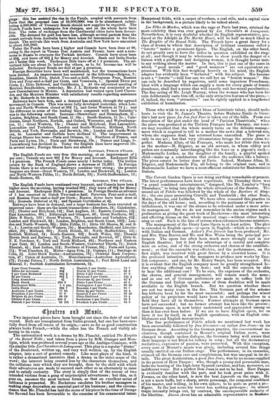Iltratrto mat Zuoir.
Two important pieces have been brought out since the date of our last record. Both are transplanted from Gallic ground, but one has been care- fully freed from all traces of its origin,—save so far as good construction always looks French,—while the other has the French soil visibly ad- hering to its roots.
The nationalized work is a drama by Mr. Planebe, entitled The Knights of the Round Table; and taken from a piece by MM. Granger and Mon- tipin, which was produced several years ago at the Ambigu-Comique with the similar title Les Chevaliers de Lansguenet. This play is a regular " d;ame" of the Boulevard, written up, and very well written up, by the English adapter, into a sort of genteel comedy. Like most plays of the kind, it is rather a dramatized narrative than a drama in the strict sense of the word; the intereet being created less by the characters themselves, and the collisions into which they are brought, than by the skill with which their adventures are made to succeed each other so as alternately to raise and to satisfy curiosity. The story is simply that of the rescue of two intended victims from a gang of unprincipled adventurers ; but this, as it goes on, assumes the most various forms, so that an excellent -series of tableaux is presented. Mr. Buckstone emulates his brother managers in making stage decoration an essential part of his business ; and the circum- stance that Mr. Planehe has laid the scene of his piece in the time of George the Second has been favourable to the exercise of his ornamental talent Hampstead fields, with a carpet of verdure, a real stile, and a capital view in the background, is a picture likely to be talked about.
Les Filles de Marbre, which was the rage at Paris last year, attained far more celebrity than was ever gained by Les Chevaliers de Lanquenet. Nevertheless, it is very doubtful whether its English representative, pro- duced at the Adelphi as The Marble Heart, will be half so much liked as The Knights of the Round Table. The French have a great fancy for a class of drama in which that description of brilliant courtesan called a "lorette " makes a prominent figure. The English, on the other hand, do not greatly care to have the ladies in question exhibited on the stage at all ; and though it may be wholesome to show youth the danger of a liaison with a profligate and designing woman, it is thought better taste to say nothing about the matter. In fact, this is just one of the cases in which "good morals" and "good manners" are not equivalent ex- pressions. With this fact weighing heavily on his mind, the English adapter has evidently been " bothered " with his subject. His heroine is not a " lorette "—still less can we call her an "honest woman." She can only be described by negatives, until some ingenious Frenchman, blest with a language which can supply a term for every grade of female decadence, shall find a name that will exactly suit her moral peculiarities. The fine acting of Mr. Leigh Murray, when the woman who has been his ruin deliberately casts him off, is the only attractive feature of the piece,— if, indeed, the term "attractive" can be rightly applied to a lengthened exhibition of humiliation.


























 Previous page
Previous page